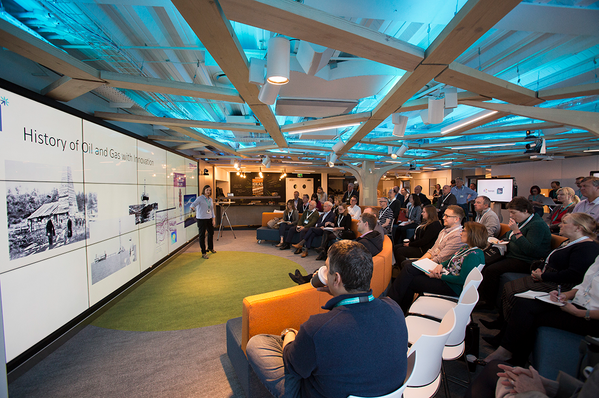
New research delivered in partnership with the Oil & Gas Technology Centre (OGTC) and Robert Gordon University (RGU) has reached a milestone in understanding the psychological processes that govern technology adoption and deployment decisions.
Dr. Ruby Roberts, Organisational Psychologist and Research Fellow from RGU has completed the first two phases of the project. This includes an extensive literature review and a series of interviews with those who work in the sector to identify existing knowledge gaps.
Phase one undertook a literature review, with the aim of identifying what, if any, research has been conducted in relation to the psychological factors influencing technology adoption and deployment in the oil and gas industry. Despite the relevance for the industry, limited research was identified. A common message within these papers was that there is a continuing need for this sector to harness the potential of technology innovation and support adoption, yet only five psychological factors were identified. These were personality, attitudes, social, cognition and psychological factors at an organizational level.
Building upon the literature review, phase two conducted an in-depth interview study to further examine the underlying psychological factors that influence technology uptake. This included talking to a wide range of people involved in technological innovation in the oil and gas industry. Analysis of the interviews identified similar psychological factors, highlighting the importance of leadership and supporting a positive technology adoption culture.
Dr Roberts said, “Innovation is key to the oil and gas industry, critical to its success. Whilst it is no surprise that the industry needs to harness the potential of technology adoption, uptake can still be incredibly low. While market and organizational factors can impact on adoption, it’s the psychological barriers that are the strongest and least understood.
“The review and interview study confirmed whilst there has been very little research to identify the factors that impact on technology adoption, these factors play a significant role on successfully introducing technology. If harnessed correctly, these factors can be powerful for the industry.”
Dr Roberts will be presenting the findings from phase two at SPE Offshore Europe 2019 in Aberdeen on Friday, September 6..
Luca Corradi, Innovation Network Director, who supports the project on behalf of the OGTC, said, “To maximize the opportunities for the adoption of newly developed products, there is a need to better understand how psychological factors impact on the acceptance and deployment of innovative technology in industry.
“This is particularly prevalent given the OGTC are at the heart of supporting the delivery of game-changing technologies that will unlock the full potential of the UKCS and support the transition towards a net zero emissions society. Our elite start-ups and technology developers are shifting the dial, and there is an appetite for what they can deliver, however understanding the barriers to adoption and developing approaches to overcome them, will really give us the edge to increase uptake and maximize impact.”
Professor Paul Hagan, Vice Principal for Research and Deputy Principal at RGU, said, “The Fourth Industrial ‘Digital’ Revolution is driving rapid evolution of technology leading to fundamental changes in the way we work. If we are to benefit fully from the power of this new technology we need to understand how to overcome the psychological barriers to technology adoption and deployment. These barriers may not be unique to the oil and gas sector. Every industry needs to adapt. So, the potential impact of this project in realizing economic benefits is huge.
“This project builds on RGU’s existing strong links with the OGTC and the oil and gas industry. For decades the university has partnered with industry to deliver demand-led solutions to their major challenges. Such collaborations are essential to ensuring business success and economic growth.”
In the next phase of the project, the knowledge gaps identified will be addressed through case studies (phase three) and experimental ‘Dragon’s Dens’ (Phase 4). Based on the findings, the final phase will involve the development and evaluation of a psychological toolkit, set up to support technology adoption in the upstream oil and gas industry of the UKCS. The findings are expected in July 2020.